

Cover Letter For a Job Fair: Examples and Tips
One of the best ways to land a job, especially your first job, is to connect to as many employers as you can. There’s no better place to do that than a job fair. Of course, you need to show up armed with a professional appearance, outgoing personality, resume, and cover letter.
But the question is, how do you write a cover letter for job fair events? It’s a bit different than sending one for a dedicated job application, but it’s something anyone can do with a little help. Start by reading the example letter here and checking out some great tips.
Cover Letter Sample For Job Fair in .docx Format
Here is a great example of a cover letter that a student might take to a university-sponsored job fair.
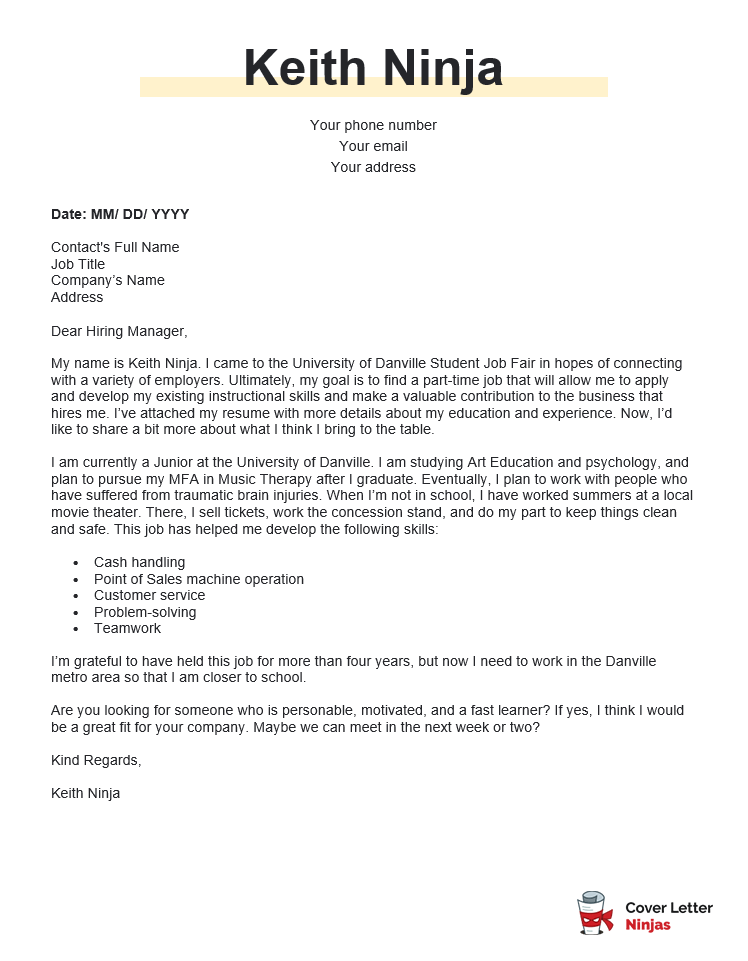
Download example (Word version)
Cover Letter Example For Job Fair – Text Format
Dear Hiring Manager,
My name is Keith Ninja. I came to the University of Danville Student Job Fair in hopes of connecting with a variety of employers. Ultimately, my goal is to find a part-time job that will allow me to apply and develop my existing instructional skills and make a valuable contribution to the business that hires me. I’ve attached my resume with more details about my education and experience. Now, I’d like to share a bit more about what I think I bring to the table.
I am currently a Junior at the University of Danville. I am studying Art Education and psychology, and plan to pursue my MFA in Music Therapy after I graduate. Eventually, I plan to work with people who have suffered from traumatic brain injuries. When I’m not in school, I have worked summers at a local movie theater. There, I sell tickets, work the concession stand, and do my part to keep things clean and safe. This job has helped me develop the following skills:
- Cash handling
- Point of Sales machine operation
- Customer service
- Problem-solving
I’m grateful to have held this job for more than four years, but now I need to work in the Danville metro area so that I am closer to school.
Are you looking for someone who is personable, motivated, and a fast learner? If yes, I think I would be a great fit for your company. Maybe we can meet in the next week or two?
Kind Regards,
Keith Ninja
How to Write a Cover Letter for a Job Fair: Tips
As you can see, this cover letter is a bit different from other cover letter examples we provide for specific positions.
That’s because you are not really sure whom you’d click with during the fair. So how do you write a generic cover letter that still makes a solid impression? Here are our tips.
Start With a Generic Outline
Go to the job fair with an open mind. You never know. A company you’ve never heard of turns out to be the perfect match for you. Of course, since you’re casting so wide, it’s hard to be specific.
In any other case, you would write a cover letter that was specifically tailored for a single company. When you attend a job fair, you’ll be meeting a range of people and sharing your cover letters and resumes with many different companies. So, personalization really won’t work. Instead, you’ll need to write a one-size-fits-all cover letter.
Start with a general outline:
- Think about a certain industry you plan to target
- Consider which of your skills and experiences will be the most stand-out
- Put down a high-level overview of these
- Add a punchy cover letter opening
- Round up with a concluding paragraph, offering to check your resume, connect on LinkedIn, or contact you for more details.

Show Your Personality
There may be hundreds, even thousands of attendees at a job fair. Chances are, the hiring managers accepting applications will probably not remember you. That’s why you have to stand out.
Write in a way that is friendly and personable. Talk about your work style, and discuss your ideal work environment. Show how you would be a desirable employee and colleague. Share a unique personal fact or two to really make a mark.
List Your Skills
Think of your hard and soft skills that will be valuable to any employer in a range of Industries. Make a list of those and add them to your cover letter. Use bullet points to make them stand out similarly to how the writer did in the sample above.
Use Impeccable Spelling and Grammar
Once again, a job fair may generate hundreds of applicants for any position. Use your professionalism and attention to detail to stand out. Your cover letter should be painstakingly edited so there are no spelling or grammar mistakes. Take your time doing this. Invest in grammar and spell-check app.
Final Tip: Do Some Preliminary Research
Don’t lose your house to attend a job fair without learning as much as possible about the attending companies. If you can identify which employers are most interesting to you beforehand, you can better plan your time at the job fair. You may be able to find some information about the companies that will be present on the job fair’s website, as well as any specific schedules for other activities and events.
New to the Workforce? Check Other Entry-Level Cover Letters
- Sample cover letter with no experience
- High school student cover letter example
- Part-time cover letter example
- Internship cover letter example
Other Cover Letter Samples
A composed cover letter example for a musician, banging backstage cover letter example, a cover letter example for business and administrative jobs, social worker cover letter example with actionable writing tips.
A huge collection of cover letters created by a ninja team of writers and career advisors. Learn how to write, style and file cover letters that employers actually enjoy reading.
© Copyright 2023 Cover Letter Ninjas
- Privacy Policy
- Cookie Policy
- Terms and Conditions
- Disclosure Policy
How to Send a Career Fair Follow-Up Email [Samples Included]
In This Guide:
Why should you write a follow-up email after a career fair, how can you write an effective career fair follow-up email, email templates.
Quick Answer: To get noticed by recruiters and differentiate yourself from other candidates who may be applying for the same position. Timing is crucial, so make sure to send a brief, professional email with an eye-catching subject line within 24 hours of meeting them. Be specific about the position you're applying for and ask for an interview.
In a perfect world, you could show up at a job fair and instantly get a job. Although sometimes this may be the case, in most cases, jobseekers are going to need to continue to reach out to recruiters and potential hiring managers.
If you want to succeed in the recruitment process, sending a follow-up letter or email after a career fair can help raise your chances of being noticed. If you send an email with a courteous and professional tone, you can expect to get ever so closer to landing an influential position at your dream company.
In this article, you will discover:
- Why you should send a follow-up email after a career fair.
- How to write a career fair follow-up email.
- Examples of follow-up emails
If you're interested in leaving a great first impression with a hiring manager, speak with a career counselor from Enhancv . They can walk you through everything you need to know to present yourself as a strong candidate.
Upload & Check Your Resume
Drop your resume here or choose a file . PDF & DOCX only. Max 2MB file size.
The simple answer is to get noticed.
There may be dozens of other people applying for the same position, many of whom may have come to the career fair. Your goal is to differentiate yourself from the rest of the candidates, and you can do this by sending just a brief email to a recruiter's inbox.
Keep it brief
A follow-up email is not the time to share about your whole career history or where you'd like to see yourself in 10 years, but a follow-up email is a chance to make yourself more memorable. Therefore, keep the follow-up email brief and straight to the point.
If you want an interview, be sure to ask that in a call to action at the end of the email. Maybe you'd like to learn more about the company, than mention that in the email, but just don't beat around the bush.
Email shortly after the meeting
Timing is everything! If your goal is to become memorable in the mind of a recruiter, send an email about 24 hours after you meet them. This similar way to emailing after an interview , as emailing right after meeting a hiring manager allows you to stay fresh in their mind. If you wait to email, there's a good chance that they may forget you, but if you strike while the iron is hot, you can be sure to leave a lasting impression.
Be professional
When you're sending an email to a potential hiring manager, try to make sure that you keep a professional and courteous tone in the email. This is especially true if you are applying for a position at a more conservative company, like at a bank or government facility
Reference the career fair follow in the subject line
A good subject line helps to draw the attention of the recipient, making them want to open the email. In this case, writing an eye-catching subject line is as simple as referencing the job fair you met at. Look at these examples below:
- Subject line: Re: Orlando Springs Job Fair
- Thanks so much for speaking to me at the career fair opportunity
Job fair follow-up email: Internship position
Subject line: Denver Job Fair
Dear Mr. Nichols,
Thank you so much for taking the time to chat with me about your organization Polytech, and explaining all the opportunities there. I want to pursue the internship marketing position at your organization, and I believe I will add a unique skill set to your organization.
In university, I majored in journalism and marketing, and I gained an understanding of how to craft interesting copy which can convert clients. I also was the leader on my university's debate team, and from there I gained great public speaking skills.
Please let me know if you need any additional information from me, I've also attached my cover letter and resume to this email. I like to sit down for an interview and chat more about the role within your organization.
What does this email do well?
One of the best things that this email does is that it gets straight to the point. In the subject line, the author of the email explains the job fair location. They also shared the internship position they are applying for, and why they believed they would be a good fit for the organization.
Job fair follow-up email: Personal connection
Subject line: Thank you so much for chatting with me yesterday at the job fair
Dear Frank Connell,
Thank you so much for taking the time out of your day to talk to me yesterday about you and your organization. After we finished chatting, I realized we had a mutual connection, as I know Hank Vandervelde, who you went to university with. I spoke with him last night and shared how I'm met you at the job fair.
As I mentioned yesterday, I believe I would be the perfect fit for your organization as I am a lifelong learner, able to gain an understanding of new skills and implement them in my day-to-day work. I'm also passionate about doing the best job that I can.
I'd love to connect with you about a potential career at your company, and I'm excited to hear from you.
All the best,
The author of this email mentions a personal connection with the recruiter, and this can help to open up doors with them. If the person who you're mentioning is a family member or close friend of the recruiter, then you can ask the personal connection to put in a good word for you.
LinkedIn Direct Message
Another way to reach out to potential hiring managers is to find them on LinkedIn, and to reach out to them there.LinkedIn is a great place to build your network, and may also provide you with an opportunity to reach out to a recruiter. In a LinkedIn message, you can also attach files, like your resume and cover letter. Below, you can find an example of a LinkedIn direct message:
Dear Stacey,
Thank you so much for taking the time out of your busy schedule to speak with me at the career fair in Austin yesterday. I really enjoyed learning more about your company, and I feel like would be a great fit there.
I'm an excellent candidate for the director of sales because my career goals line up perfectly with your organization, and I've used my leadership skills as an associate director of sales to motivate large teams of salespeople. Despite the recent economic slowdown, my team continued to hit record sales numbers.
I would love to set up a time to chat more about this position, specifically to interview for this position. thank you so much,
Dianne Fersma
What does this message do well?
Although sending a LinkedIn message may differ from emailing, they follow the same formula. Even in a LinkedIn message, you should share the location of the last touch point, as well as the position you're applying for. Don't be afraid to put yourself out there and ask for an interview. Your call to action should be specific to what you want from the exchange.
- Keep a follow-up email brief, and to the point.
- Use an eye-catching subject line to catch the attention of the reader.
- Be sure to email shortly after meeting a potential recruiter.
Creating memorable first impressions is a difficult thing to do. But if you speak with a career counselor from Enhancv , you can learn ways to make yourself more memorable in a recruiter's mind.

- Resume Guides
How Hotjar built a 100% distributed company
How to create a general cover letter (with examples and tips), should i put my linkedin url on my resume, what not to put on a resume, 129+ resume objective examples and how-to guide for 2024, should i bring a copy of my resume to an interview.
- Create Resume
- Terms of Service
- Privacy Policy
- Cookie Preferences
- Resume Examples
- Resume Templates
- AI Resume Builder
- Resume Summary Generator
- Resume Formats
- Resume Checker
- Resume Skills
- How to Write a Resume
- Modern Resume Templates
- Simple Resume Templates
- Cover Letter Builder
- Cover Letter Examples
- Cover Letter Templates
- Cover Letter Formats
- How to Write a Cover Letter
- Cover Letter Guides
- Job Interview Guides
- Job Interview Questions
- Career Resources
- Meet our customers
- Career resources
- English (UK)
- French (FR)
- German (DE)
- Spanish (ES)
- Swedish (SE)
© 2024 . All rights reserved.
Made with love by people who care.
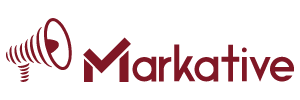
Best Follow-Up Letter After Career Fair with 5 Examples
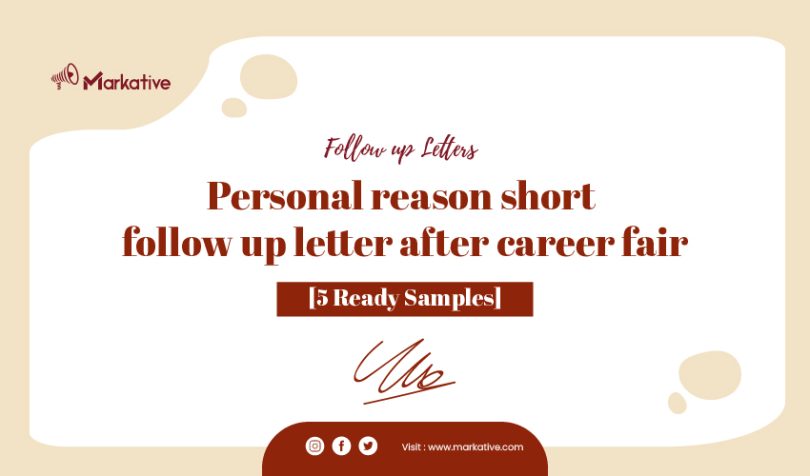
Attending a career fair can be exciting and nerve-wracking all at the same time. You’ve gone around to many companies and talked to various recruiters, but what do you do next? One essential step after attending a career fair is following up with the recruiters you about the jobs you’re interested in. Writing a follow-up letter is an excellent way to build a connection with the recruiter and stand out amongst other candidates. In this article, we’ll discuss the key components of a follow-up letter and provide five ready-to-use samples to help you get started.
Why is Writing a Follow-Up Letter After Career Fair Important?
Writing a follow-up letter after a career fair is crucial to enhance your chances of getting hired for the job. It provides a unique opportunity to showcase your professionalism and attention to detail. Your letter can express interest in the position, highlight your qualifications for the job, and build a relationship with the recruiter.
Moreover, writing a follow-up letter also enables you to distinguish yourself from other candidates that didn’t take the time and effort to follow up. It can also help demonstrate genuine interest and enthusiasm in the job opportunity to the recruiter.
For More: Follow Up Letter for Job Opportunity 5 Ready Templates
Four Key Components of an Effective Follow-Up Letter After Career Fair
To make the most out of your follow-up letter, it’s important to know the key components that make an effective and compelling follow-up correspondence. Here are four components to keep in mind:
- Introduction: The first component of your follow-up letters should be an introductory statement that reminds the recruiter who you are briefly. What position you are interested in pursuing at the career fair.
- Reinforce Your Interest: In the second component, it’s essential to reaffirm your interest in the position. You can restate why you’re interested in the role and what you find appealing about the company. Keep this area short but informative, and try to give the recruiter a sense of your personality while doing so.
- Highlight Your Qualifications: Introduce your relevant background, skills, and qualifications that make you a great candidate for the position you’re applying for. Highlight any experiences that align with the job description and truly make you stand out. Be sure to maintain a professional tone and attitude throughout.
- Call to Action: Finally, end the letter with a call to action that encourages the recruiter to contact you to discuss the position further. This could be a phone call or an email. The message should convey your openness to continue discussing the opportunity further.
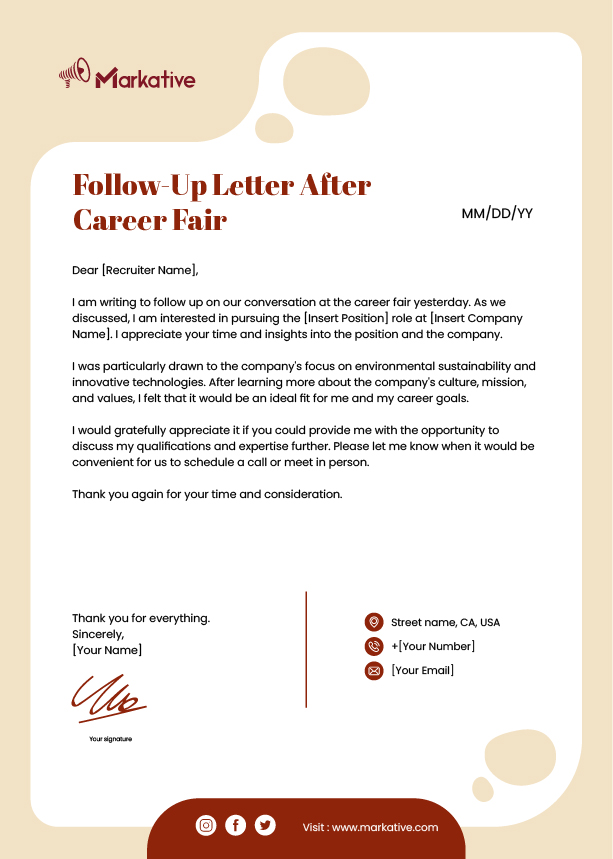
Sample Follow-Up Letter After Career Fair
Best follow-up letter after career fair.
For More: Best Simple Follow-Up Letter: 5 Ready Samples
Good Follow-Up Letter After Career Fair
Great follow-up letter after career fair.
For More: Great Professional Follow-Up Letter: 7 Templates
Creative Follow-Up Letter After Career Fair
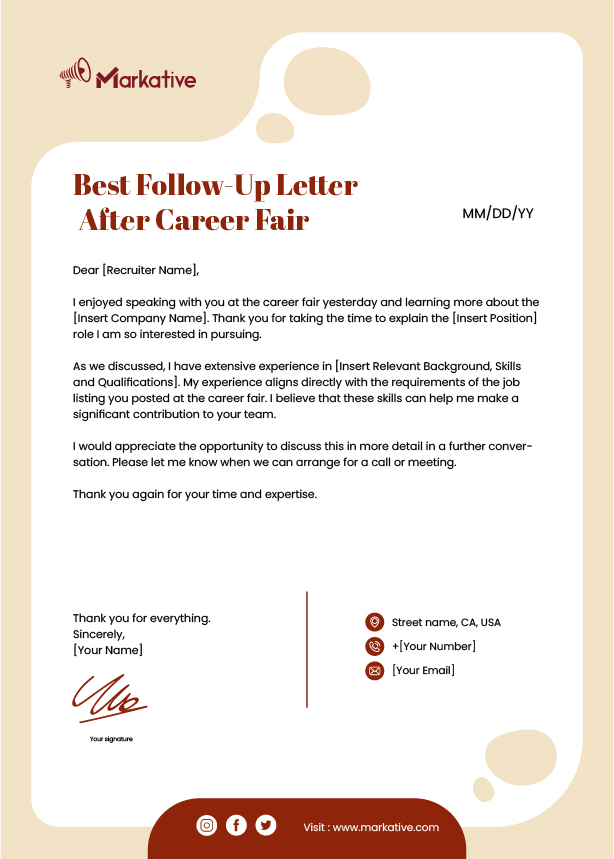
Key Takeaway
Following up with a recruiter after attending a career fair can be an effective way to stand out from other candidates. Build a strong connection with the hiring team.
Writing an outstanding follow-up letter requires a thoughtful and professional approach, highlighting your skills, qualifications, and interest in the position. Use the provided samples to get ideas as you draft your own, and remember. The most important thing is to express your enthusiasm about the opportunity! Good luck with your career fair follow-up letters!
You may also like
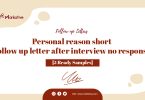
Best Follow-Up Letter After Interview No Response [5...
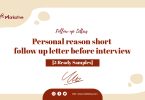
Creative Follow-Up Letter Before Interview: 7 Samples
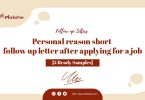
Great Follow-Up Letter After Applying for a Job: 7...
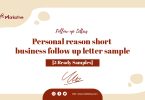
Best Business Follow-Up Letter Sample 7 Ready Templates
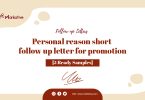
Best Follow-Up Letter for Promotion: 5 Samples
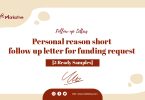
Follow-Up Letter for Funding Request With [ 11+...
About the author.
I have a five-year Experience in Digital Marketing Run Different Blogs & Businesses That Generate six Figure Income. I am Happy to Consult Startups & New Businesses & You to Make your Business a Brand.

- Appointments

- Resume Reviews

- Undergraduates
- PhDs & Postdocs
- Faculty & Staff
- Prospective Students
- Online Students
- Career Champions
- I’m Exploring
- Architecture & Design
- Education & Academia
- Engineering
- Fashion, Retail & Consumer Products
- Fellowships & Gap Year
- Fine Arts, Performing Arts, & Music
- Government, Law & Public Policy
- Healthcare & Public Health
- International Relations & NGOs
- Life & Physical Sciences
- Marketing, Advertising & Public Relations
- Media, Journalism & Entertainment
- Non-Profits
- Pre-Health, Pre-Law and Pre-Grad
- Real Estate, Accounting, & Insurance
- Social Work & Human Services
- Sports & Hospitality
- Startups, Entrepreneurship & Freelancing
- Sustainability, Energy & Conservation
- Technology, Data & Analytics
- DACA and Undocumented Students
- First Generation and Low Income Students
- International Students
- LGBTQ+ Students
- Transfer Students
- Students of Color
- Students with Disabilities
- Explore Careers & Industries
- Make Connections & Network
- Search for a Job or Internship
- Write a Resume/CV
- Write a Cover Letter
- Engage with Employers
- Research Salaries & Negotiate Offers
- Find Funding
- Develop Professional and Leadership Skills
- Apply to Graduate School
- Apply to Health Professions School
- Apply to Law School
- Self-Assessment
- Experiences
- Post-Graduate
- Jobs & Internships
- Career Fairs
- For Employers
- Meet the Team
- Peer Career Advisors
- Social Media
- Career Services Policies
- Walk-Ins & Pop-Ins
- Strategic Plan 2022-2025
The Right Way to Follow Up After a Career Fair (Email Template Included!)
- Share This: Share The Right Way to Follow Up After a Career Fair (Email Template Included!) on Facebook Share The Right Way to Follow Up After a Career Fair (Email Template Included!) on LinkedIn Share The Right Way to Follow Up After a Career Fair (Email Template Included!) on X
When you show up to a career fair, they just give you a job, right? If only it were that easy. While career fairs serve up great introductions to companies, recruiters, and career paths you may choose to follow, it’s still on you to leave a lasting impression that inches you ever-so-closer to landing a real interview—and a great job.
Being prepared and asking the right questions will help you stand out during the event itself. But when the career fair is over, don’t forget to send a proper follow-up email, too.
After all, recruiters attending career fairs often end up meeting dozens of quality candidates—and it might be weeks or even months before they actually fill an open role or internship position. A great thank you email not only highlights your interest in the company and demonstrates good business etiquette, it ensures you stick in the recruiter’s mind.
So what do you say to make yourself memorable? Use these super easy tips to craft a perfect career fair follow-up email. We’ve even got a template you’re free to copy and paste, along with an example!
Connect Quickly
Aim to send your career fair follow-up email within 24 hours of the event. Why? Recruiters are perpetually inundated with email and don’t always have time to respond to every connection or follow up. That’s especially true after a career fair ends. Typically, it takes a couple of days for a recruiter to sit down and sort through the mountain of messages they received as a result of the event.
But if you can make it into the first batch of emails to hit the recruiter’s inbox, you’ll have a better chance of staying top-of-mind as the recruiter starts connecting with candidates—and even more so when weighed against those who chose not to follow up at all.
Keep It Simple—and Short
There’s no need to reinvent the wheel here. As with any great thank you note , you should simply thank the recruiter for their time and express a desire to connect down the line. The recruiter should already have your resume, so there’s no need to attach it, says Muse Career Coach Victoria Morell , Associate Director of Miami University Farmer School of Business Careers—though if you’re worried and want to attach it anyway, it won’t hurt.
“Keep it light, nice, short, and to the point, but include something that makes them remember you or read a little bit further,” Morell adds. Referring to a personal connection from your meeting, such as a common hobby or interest you discussed, can help remind the recruiter of your initial encounter.
Be Professional
Even though it’s just a brief thank you email, that doesn’t mean it’s an opportunity to act casual. Pay attention to the tone of your email so you don’t seem flippant, nonchalant, or unprepared for a professional work environment.
For instance, don’t open your message with a casual greeting like “hey”—always choose a proper introduction, like “hi” or “hello,” to set a courteous and professional tone. It also doesn’t hurt to err on the side of formality in how you address the recruiter—think “Mr. or Ms. [Name],” rather than a first name, unless you know for sure that the company is super casual.
“At this stage in the recruitment process, you’re still trying to impress them,” notes Morell, likening the tone of a thank you email to a job interview. “Even if you know it’s a casual dress code, you’re still going to dress well for the interview to show you’re serious.”
Try this email template to put it all into practice:
The Template
Hello [Name of Recruiter],
Thanks again for the opportunity to meet you at the [name/location of career fair] on [date]! [Personal detail.]
It was great learning about [detail from meeting], and I believe my [relevant, personal experience] would make me a great fit for [Company].
I would love to connect regarding a potential career with [Company] and look forward to hearing from you in the future.
Thanks again for your time!
Best, [Your Name]
Hello Mr. Minnick,
Thanks again for the opportunity to meet you at the Michigan State University IT Career Fair on March 16. I also appreciate getting to know a fellow Alpha Psi Omega member!
It was great learning about your vision for the future of web development, and I believe my experience studying and coding HTML5 with modern web design standards would make me a great fit for DataWorks.
I would love to connect regarding a potential career with DataWorks and look forward to hearing from you in the future.
Best, Megan Childers
Explore Jobs
- Jobs Near Me
- Remote Jobs
- Full Time Jobs
- Part Time Jobs
- Entry Level Jobs
- Work From Home Jobs
Find Specific Jobs
- $15 Per Hour Jobs
- $20 Per Hour Jobs
- Hiring Immediately Jobs
- High School Jobs
- H1b Visa Jobs
Explore Careers
- Business And Financial
- Architecture And Engineering
- Computer And Mathematical
Explore Professions
- What They Do
- Certifications
- Demographics
Best Companies
- Health Care
- Fortune 500
Explore Companies
- CEO And Executies
- Resume Builder
- Career Advice
- Explore Majors
- Questions And Answers
- Interview Questions
How To Write A Follow Up Email After A Career Fair
- Interview Confirmation Email
- Thank You For Your Time
- Follow Up Email After Career Fair
- References Available Upon Request
Find a Job You Really Want In
“It’s not what you know, it’s who you know.”
Whether you agree with it or not, this mantra is becoming a fact of life more and more. To get your foot in the door at your dream job (or just an okay job), you often have to have a connection within the organization.
This connection doesn’t have to be made at a country club or exclusive dinner party, though. One of the best ways to get face-to-face interactions with people on the inside of companies you want to work for is through a career fair.
In this article, you’ll learn about how to further solidify the connections you make at these events so that you can make the most of your time at a career fair .
Key Takeaways:
Sending a follow up email after a career fair increases the chances that your resume gets a second look.
Be targeted in who you decide to follow up with and make sure your email is specific to that person.
Try to collect contact information while at the career fair.
Send your follow up email sooner rather than later, and don’t hesitate to jog their memory by providing context.
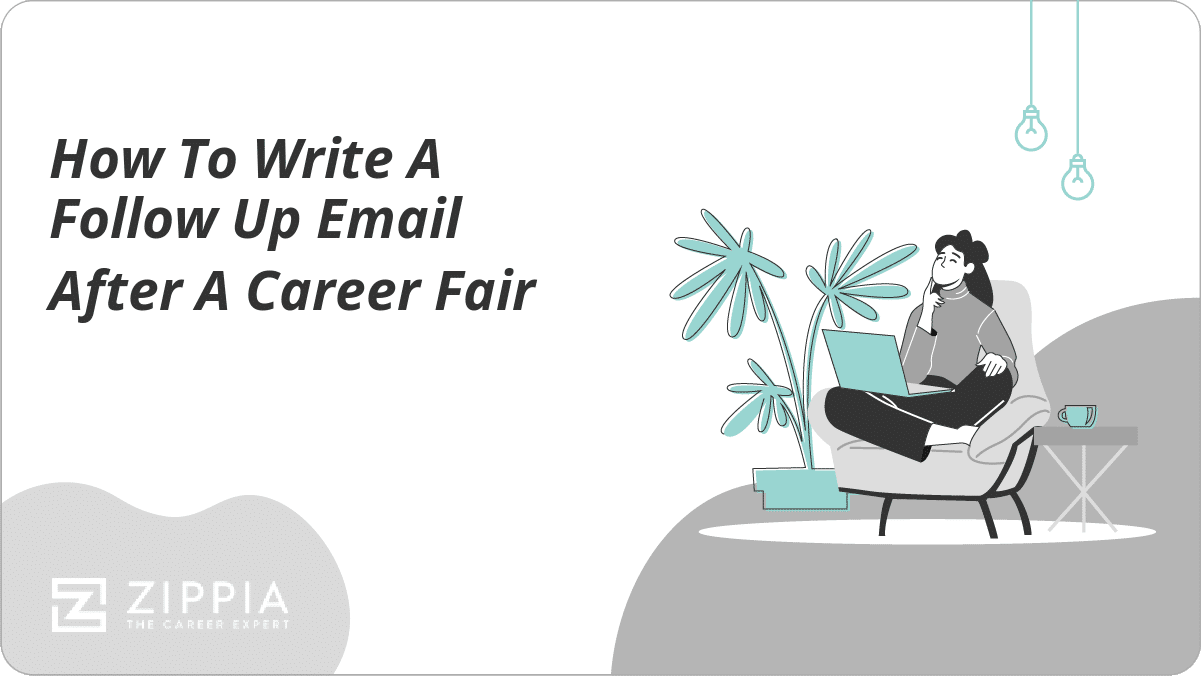
What Is a Career Fair?
How to follow up with a recruiter after a career fair, optimizing your follow up email, additional tips for writing a follow up email, 5 example follow up emails to send after a career fair, career fair follow up email faq.
- Sign Up For More Advice and Jobs
A career fair is an event where you can meet face-to-face with representatives from many different companies. These fairs invite several organizations, often in the same industry, to set up booths so that college students and other job-seekers can visit with recruiters and learn more about the organizations they work for.
Sometimes recruiters will simply offer basic information about what they do, but sometimes they will also talk about specific positions that they have open. They can also answer questions you might have and will often want to know about your goals and qualifications, so practice your elevator pitch and bring copies of your resume .
Recruiters won’t conduct an in-depth interview or give you a job right then and there. Still, they will go forward knowing that you’re an enjoyable person to talk to, knowledgeable about the industry, and passionate about your field. This can go a long way when it’s time for them to consider candidates.
So, now the career fair is over, and you’ve talked with people at several companies you’re interested in. Unfortunately, they also met with hundreds of other people, sometimes all on the same day, so they likely don’t remember much about you.
To increase your chances of getting an interview or even a second look at your resume, you’ll need to follow up to show that you really are interested in the position. Here’s how:
Decide which positions and companies you want to contact. Follow up with a handful of recruiters you connected with, whether you think their companies will provide you with the opportunity for your dream job or not.
Find the recruiter’s contact information. Ideally, you will have a business card with an email address on it, but you can also check the company’s directory for their email address.
Send a follow-up email. Send a polite message reemphasizing your interest in the company and any specific positions you discussed.
Follow up again. If 10-14 days go by without a response to your follow up email, it might be time to send a polite nudge. Don’t be a nuisance about it because they probably have a stack of resumes to go through, but you also want to show that you’re serious.
There are a couple of things you should do to make your follow up email as effective as possible:
Send it sooner rather than later. To make the most of your follow up email, you’ll want to send it within 24 hours of the career fair. This way, the recruiter has a better chance of remembering you and will see that you genuinely are interested in the company.
Try to stick within regular working hours, if possible, but take whatever chance you can to shoot them a message, even if it’s on the bus at 9:00 at night.
Sending an email quickly isn’t enough, though. You’ll need to help the recipient put your name with your face.
Jog the recruiter’s memory. Personalize your email and help the recipient remember who you are by including a unique detail about your interaction. Say something like, “I enjoyed connecting over our mutual love of seafood,” or “ thank you for helping me pick up my papers when I dropped them.” If all else fails, say, “I was the one with the bright yellow raincoat.”
It may seem like an awkward thing to say, but recruiters will like the touch of personality and appreciate you making the connection for them.
While sending your letter quickly and making yourself memorable are the two most important things to remember when writing your follow up email, here are some additional tips:
Write a different email for each recipient. Your email should be personalized to the recipient. If you just send out five of the same email, recruiters will think that you don’t remember them either and aren’t really interested in the job.
Say thank you. Thank recruiters for taking the time to talk with you at the career fair and for considering you further, even if all they do is read your email.
Attach your resume and any other relevant documents. Even if you already handed out your resume at the career fair, make recruiters’ lives easier and attach it to your email as well. This is also a great time to include some samples from your portfolio .
Include your contact information. This might sound like an obvious one, but it’s surprisingly easy to forget to add your email and phone number to your email signature.
Keep it easy to read. Shoot to write an informative yet brief email. Be personable and include what you need to in order to stand out, but don’t rehash your entire work history.
Be professional. Even if you really hit it off with a recruiter at the career fair, keep your email professional. You’re still trying to make a good impression, so avoid being overly casual and buddy-buddy.
Proofread, proofread, proofread. Another major part of making a good impression is to check your email for errors before you send it.
Here are some examples of follow up emails that you can use to get started on yours. Remember to adjust your message to match your personality and work experience, though.
Dear Ms. Williams, I was able to speak with you at the University of Denver career fair yesterday, and I just wanted to say thank you for taking the time to tell me more about Advertising Co. and all that you do there. I really appreciate your insight about digital marketing strategies and the information you shared about your career path . I also wanted to reiterate my interest in the internship position you mentioned. By the end of this semester, I will have completed the classes necessary to meet the requirements of the internship, and I would be able to work at the company all summer. I have attached a copy of my resume and some samples of my work, and I’m happy to send a list of references if you’d like. I’ll plan to call next week so that we can set up a time to discuss this opportunity further. Please let me know if there is another time that would work best for you, though. Thank you again for your time and consideration. Sincerely, Jace Hodges 234-576-8910 [email protected]
Hello, Mr. Mayne, Thank you again for talking with me during the Greenville Career Fair on Monday. I really enjoyed getting to discuss our thoughts on the newest design trends! I also enjoyed hearing about Colbert Design and the work you do there. I too am passionate about creating a great user experience, and I believe this, combined with my twelve years of experience in graphic design, would make me a great fit for the company. I would love to talk with you some more about potential career paths with Colbert Design. Thank you for your consideration, and I look forward to connecting in the future! Sincerely, Tom Hoffman 222-333-4444 [email protected]
Good morning, Ms. Jacobs, I so appreciated getting to talk with you at the State Career Fair today. It was great to meet another Wyoming native! It was also great getting to discuss the new changes coming to the East County school district and the jobs that are opening as a result. In May, I will be graduating with my elementary education degree summa cum laude, and I will be able to begin working full-time immediately after that. I would love to be a part of the ECSD family, and I believe my skills would fit well there. Would you be willing to talk with me some more about beginning my career at ECSD? I’ve attached my updated resume as well as my transcript for your reference. Please let me know if you have any questions or would like any additional information. Thank you again for your time, and I hope to hear from you soon. Amy Mills 222-444-2222 [email protected]
Hello Mr. Peabody, Thank you for speaking with me during the Campbell College Career Fair today. I thoroughly enjoyed meeting you and talking about our shared love of linguistics classes. It was so interesting to hear your perspective on Williams Recording and about the recent job opening for a studio technician . With my music production degree and three years of experience working in a recording studio, I believe I would be a great fit for this position. I would love to connect regarding this position and a potential career at Williams Recording, and I look forward to talking with you in the future. Thank you again, Andrew McAlister 111-444-8888 [email protected]
Hi Ms. Longburn, I was able to talk with you at the Napa Valley Career Fair yesterday, and I just wanted to say thank you again for sharing about Better Construction Company and what you do there. I also appreciate your helping me find my way to that coffee shop! Your recommendation was spot on. I wanted to express my interest in pursuing a career at Better Construction Company, as with my experience both as an architect and a project manager , I believe I would fit well with your organization. I’d love to hear your advice on how I should go about this and discuss potential opportunities. Please feel free to give me a call at the number below at your convenience. Thank you again, and I hope you have a wonderful weekend! Macy Short 323-555-3333 [email protected]
How long after a career fair should I follow up?
Send a follow up email within 24 hours of the career fair. You want to reach out sooner rather than later to stay fresh on the other person’s mind. They will have seen a lot of people and within a few days it may be hard for them to remember you. However, make sure to write a thoughtful email and do not rush it.
Should you connect on LinkedIn after career fair?
Feel free to try to connect on LinkedIn after a career fair. However, understand they may not accept your request. This may be the case for a variety of reasons, so don’t take it personal. It is still a good effort to try to expand your network and develop a more meaningful connection.
How useful was this post?
Click on a star to rate it!
Average rating / 5. Vote count:
No votes so far! Be the first to rate this post.
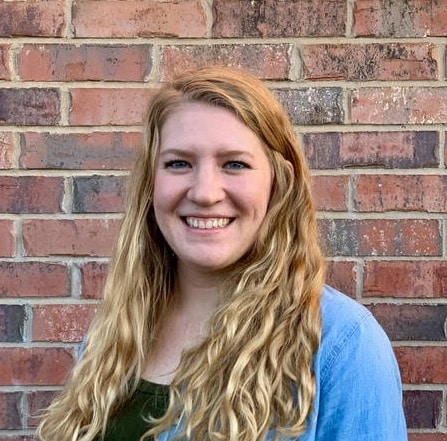
Abby is a writer who is passionate about the power of story. Whether it’s communicating complicated topics in a clear way or helping readers connect with another person or place from the comfort of their couch. Abby attended Oral Roberts University in Tulsa, Oklahoma, where she earned a degree in writing with concentrations in journalism and business.
Recent Job Searches
- Registered Nurse Jobs Resume Location
- Truck Driver Jobs Resume Location
- Call Center Representative Jobs Resume Location
- Customer Service Representative Jobs Resume
- Delivery Driver Jobs Resume Location
- Warehouse Worker Jobs Resume Location
- Account Executive Jobs Resume Location
- Sales Associate Jobs Resume Location
- Licensed Practical Nurse Jobs Resume Location
- Company Driver Jobs Resume
Related posts
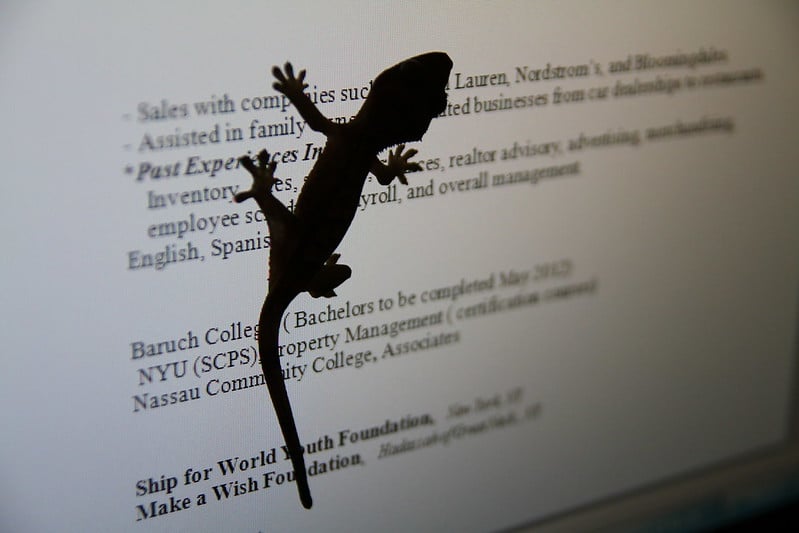
How To Upload Your Resume To LinkedIn (4 Options: Step-By-Step Guide)
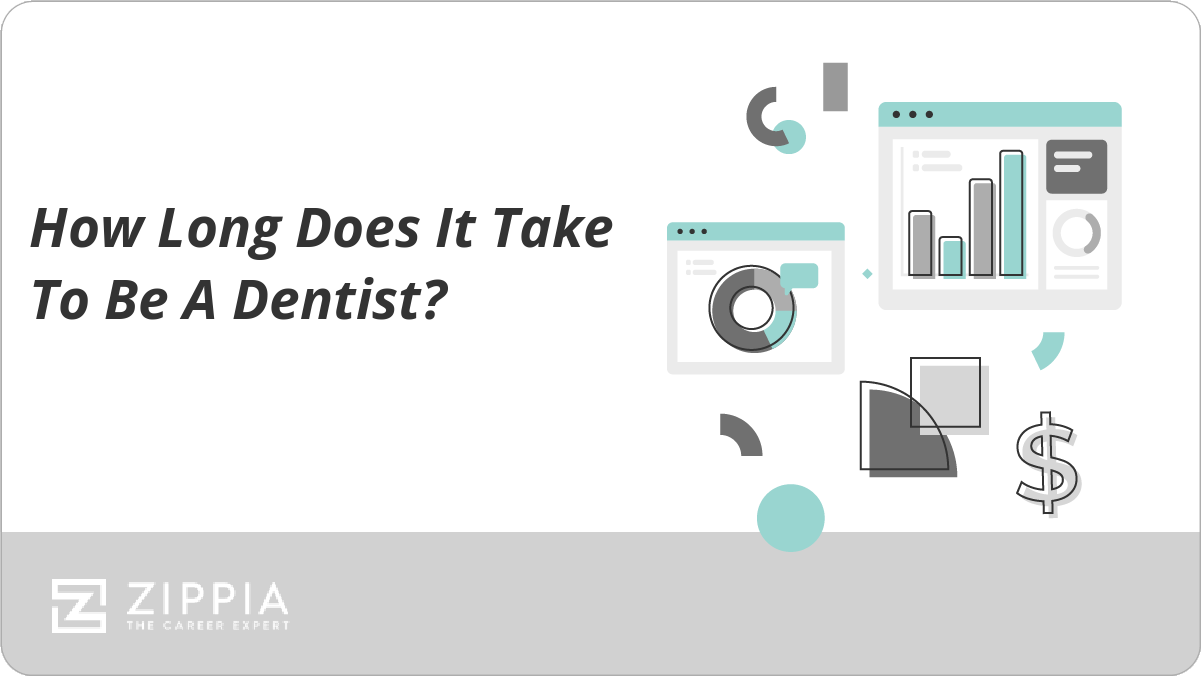
How Long Does It Take To Be A Dentist?

How To Research A Company
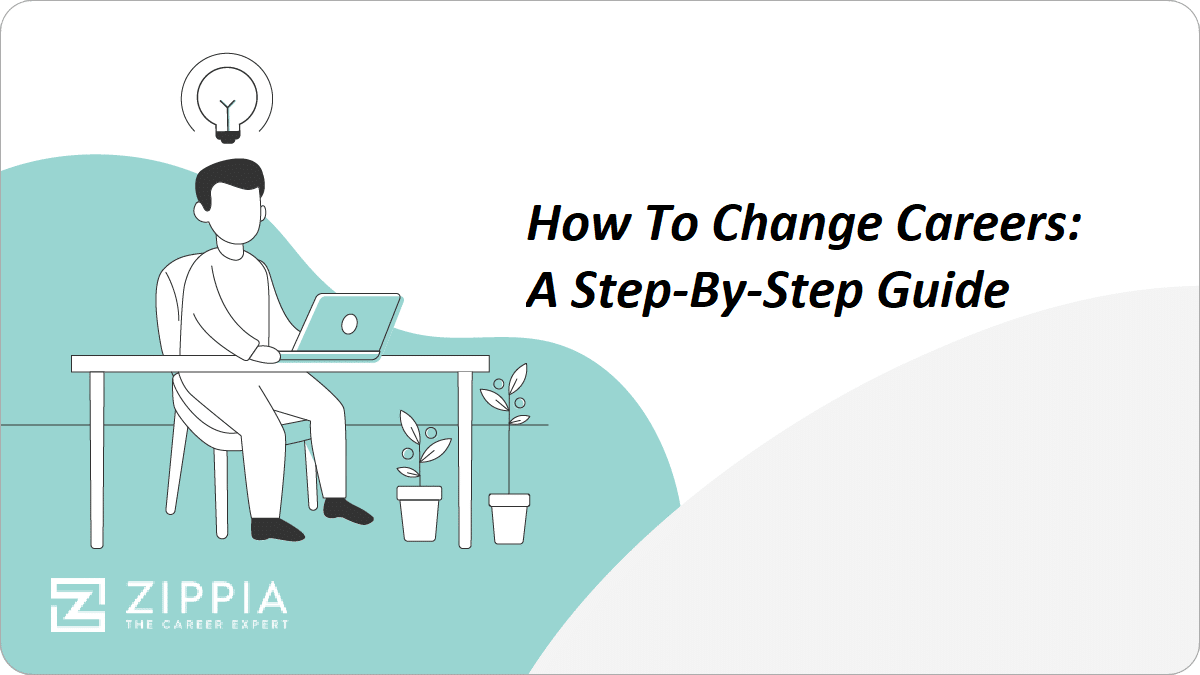
How To Change Careers: A Step-By-Step Guide
- Career Advice >
- Apply For Jobs >
How to Make Your Cover Letter General for Career Fairs
- Cover Letters
- ')" data-event="social share" data-info="Pinterest" aria-label="Share on Pinterest">
- ')" data-event="social share" data-info="Reddit" aria-label="Share on Reddit">
- ')" data-event="social share" data-info="Flipboard" aria-label="Share on Flipboard">
The Best Career Objectives to List on a Resume
Example of a cover letter for a career portfolio, curriculum vitae for the pharmaceutical industry.
- Cover Letter for Reentering the Workforce
- How to Ask for an Internship by Email
Writing a cover letter that accompanies your resume for a specific position usually states your interest in the job as well as a statement or two that shows you've studied the organization and respect its work or reputation. However, a career fair cover letter is akin to a letter of introduction that contains specific information about you and your career but doesn't include company-specific information. Reviewing some cover letter examples for career fair companies will help you craft a stronger submission.
Use an Organized Format
You can create your own application packages for the career fair. It can include copies of your cover letter, resume, list of references, writing samples and portfolio examples to hand to prospective employer representatives. You can put your documents into a simple folder with your contact information on it. Recruiters won't be happy having to lug home a three-ring binder, so keep your packet simple.
Use a Strong General Opening
It's best to start a more generic cover letter with a strong opening sentence that summarizes who are you, professionally. If you know the companies exhibiting in advance, you can write more than one resume, tailored to different industries or jobs, recommends Virginia Tech 's Career and Professional Development department.
For example, you might open with, "I'm an enthusiastic recent graduate of microbiology from the University of Arizona looking for an entry-level career role in research and development. I have significant work expertise through internships with two major research laboratories and am excited about joining an organization that rewards forward-thinking researchers with opportunities for professional development and on-the-job learning. I'm available for relocation anywhere in the United States."
State Why You're There
Don't forget to let potential employers know why you're at the job fair. Write one or two sentences about your attendance at the career fair. Include the precise name of the fair, its date and location. The reason you want to mention this is because many employers track applicants and how they learn about vacancies with their companies.
When you identify that you're a career fair attendee, it's easy for the company to track interest in the organization. In addition, you might receive recognition as a career fair attendee that you might otherwise not have received simply because of the effort to make an in-person appearance instead of simply sitting at home dispatching cover letters and resumes via email.

Provide Some Work Experience Information
Write one to two paragraphs about your functional education, training and experience, recommends jobs website, Indeed.com . If you've worked for organizations with excellent reputations in your industry or field, feel free to include their names. Prospective employers may look twice at applicants who have worked for companies that are known to have strict criteria and a reputation for hiring only the best professionals.
Include Some Accomplishments
Once you've given your abilities, prove your value by listing some accomplishments you've had. Use concrete examples about your work history. If you are a recent graduate, use your internships and college projects to describe your expertise. If you're a mid-career professional, briefly describe how your job skills and expertise have progressed through the years.
For example, an accountant who started in an entry-level position and received promotions to become department leader might describe his work history as, "In the 11 years since I joined my current employer's accounting department as an accounts payable clerk, I completed my undergraduate degree while working full-time. Within two years, I was promoted to junior accountant and given increasingly responsible assignments over the next seven years. Two years ago, I successfully passed the CPA exam and am now the department manager."
Finish With a Strong Summary
Try to make a strong last impression on the readers. Conclude your cover letter with information about your career interests. Research the career fair to determine if a particular industry will be represented. For example, some of the Big Four accounting firms recruit during college campus career fairs.
Other career fairs might focus on federal government employers or industry-specific areas such as food and beverage, hospitality or engineering. If you're attending a targeted career fair, state your interest in the industry and ask for favorable consideration of your qualifications.
- Virginia Tech: How to Prepare for Career Fairs
- Indeed: Writing a General Purpose Cover Letter: Tips, Template and Examples
- Create your own application packages for the career fair. Make several copies of your cover letter, resume, list of references, writing samples and portfolio examples to hand to prospective employer representatives.
- Dress for the career fair as you would for an interview. Many companies send their recruiters and hiring managers to conduct on-the-spot interviews. Use your appearance and application materials to convey a message to recruiters and hiring managers that you're prepared to accept a position.
Ruth Mayhew has been writing since the mid-1980s, and she has been an HR subject matter expert since 1995. Her work appears in "The Multi-Generational Workforce in the Health Care Industry," and she has been cited in numerous publications, including journals and textbooks that focus on human resources management practices. She holds a Master of Arts in sociology from the University of Missouri-Kansas City. Ruth resides in the nation's capital, Washington, D.C.
Related Articles
How to contact companies about internships, how to write a generic cover letter for multiple purposes, how to sell yourself in a cover letter, writing an open cover letter, how to write a letter looking for work, how to briefly describe the type of career opportunity you are seeking, how to write a cover letter to a previous employer, how to write a simple application cover letter, how to reply to show you are interested in the job, most popular.
- 1 How to Contact Companies About Internships
- 2 How to Write a Generic Cover Letter for Multiple Purposes
- 3 How to Sell Yourself in a Cover Letter
- 4 Writing an Open Cover Letter
Easy Career Fair Follow Up Email Templates
Advice and templates on how to follow up with recruiters in a way that will get you the job.

Follow ups are as important as first impressions.
Career fairs can be overwhelming cluster-f*cks, but if you play your cards right at a job fair, you will walk away with a real chance at finding a job you love.
The secret? Follow up. While everyone remembers to bring a resume and business card, very few people follow up with the recruiters they met. This is especially important now that networking events have gone virtual and it's harder to make a personal connection, let alone a lasting impression.
So how do you to it?
Get the Recruiter's Contact Information
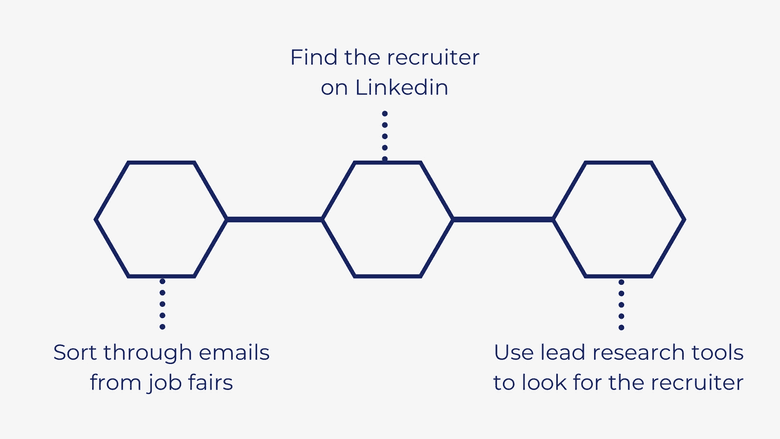
Sometimes, this will be provided during the hiring fair: you can pick up a business card in person. In a virtual environment, however, you might be out of luck. Here are our tips on how to source an email address:
- Look through the follow up emails sent from job fair organizers
- Find the recruiter on LinkedIn
- Look for the recruiter using lead research tools like Clearbit
Once you have their contact info, you can move onto the next step: reaching out.
When Should You Reach Out?
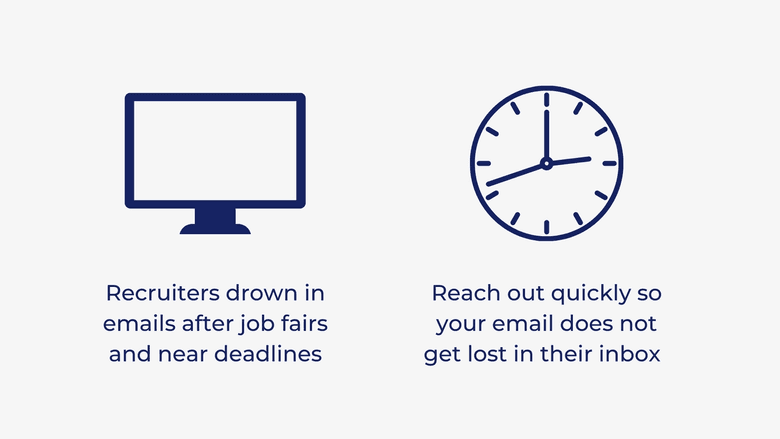
Understandably, recruiters drown in emails after a job fair, and it only gets worse as the application deadline draws near. Speed is key here, lest your email ends up at the bottom of their inbox.
Our recommendations:
- Follow up immediately: no longer than 24 hours.
- For an extra advantage, have an email template ready to go. Follow up WHILE the career fair is happening, if it's virtual.
- Be prepared to wait. Recruiters get busy and may take up to a week to get back to you.
- But don't wait too long. Politely follow up in 2-3 days to keep yourself top of the inbox.
How to Make a Lasting Impression
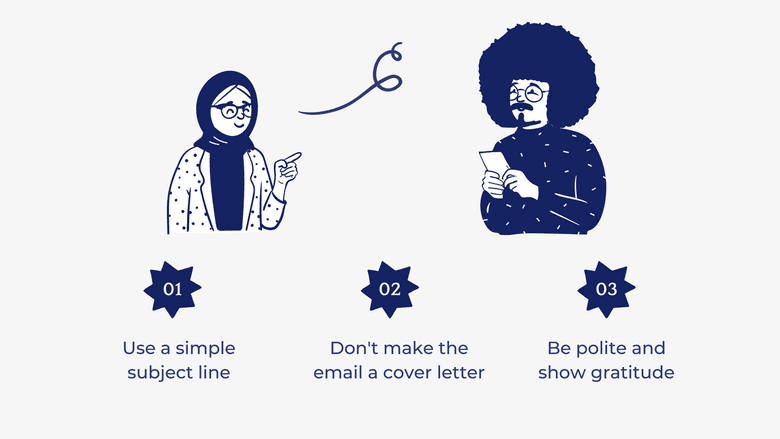
Writing a well-crafted career fair follow up email will move you to the front of the line for a job interview. But how do you write an email that makes you stand out to the recruiter?
Career coaches recommend you keep it simple:
- Create a catchy subject line to get the recruiter's attention
- Briefly tell them why this is your dream company
- Reference an open role you like
- Close out the right way: with a "Thank you"
- Of course, don't forget to send your resume and your complete contact information
Here are a few points that warrant further advice...
Keep it simple with your subject line
Harsh truth: just because you wrote an email doesn't mean they're going to open it. This is especially true if the recruiter gets overwhelmed with demand.
Some examples:
“Interested in X role [Career Fair Name]”
“Virtual Career Fair Opportunity with [Company Name]”
“Loved meeting you at [Career Fair Name]”
“Continuing our conversation from [Career Fair]”
Don't make the email a cover letter
The career fair follow up email should be short and sweet. Think of it as more of a thank you email than a cover letter. Writing an email like this is meant to re-affirm your interest in the company and help get you in touch with the hiring manager, not tell your life story. Stay to the point to keep the process moving.
- Open the email with "Hello [Recruiter Name]"
- Be specific about which open role you're interested in and why you're qualified
- Make a specific ask to be included in the hiring process
- Ask for a time to connect about the role - and be specific - "next week" is to vague
Show gratitude (but not too much)
Career coaches recommend show gratitude for the recruiter's time and effort in the follow-up email, as this helps make a better impression, and ultimately build a personal connection. Don't skip on this step!
Be polite in your email but don't over-do it. Thanking them once is enough and you definitely want to be careful to not come across as overly-grateful (that can translate to being seen as overly- desperate). A great place to include this is both in your email subject line and in your closing.
“It was a pleasure to speak with you at [Career Fair ]”
“I was very much obliged to meet you at [Job Fair]”
“Thank you for taking the time to speak with me at [Career Fair], and I am looking forward to connecting with you on what open roles would be a fit.”
Follow-up Email Templates
Here are a few email templates to have in your back pocket. Keep them handy during the job fair so you can quickly follow up afterwards and have a leg up in your job search.
And remember: always attach your resume or portfolio!
Loved Meeting you at [Career Fair Name] Hello [Recruiter], Loved meeting you at [Job Fair] today. I took a quick look at your open roles and I'm very interested in [Role Name]. I am currently [describe why you're a fit] and I am very interested in exploring this further. Would love to connect with the hiring manager for the role, if you think I'd be a good fit. Thank you for your help, [Your Name]
Touching base after [Job Fair] Hello [Recruiter], We spoke yesterday at the career fair at [Company Name]. I was thrilled to learn you have open roles in engineering. [Company name] has been my dream company for awhile and I think I'm a very strong fit for your team because [talk about your interest or qualifications]. I really appreciate the 1:1 time you spent with me during the event, especially seeing how many job seekers there were. I look forward to connecting soon! My information is attached. Best, [Your Name]
👉 Next: How to find the right hiring manager to email
The information provided herein is for general informational purposes only and is not intended to provide tax, legal, or investment advice and should not be construed as an offer to sell, a solicitation of an offer to buy, or a recommendation of any security by Candor, its employees and affiliates, or any third-party. Any expressions of opinion or assumptions are for illustrative purposes only and are subject to change without notice. Past performance is not a guarantee of future results and the opinions presented herein should not be viewed as an indicator of future performance. Investing in securities involves risk. Loss of principal is possible.
Third-party data has been obtained from sources we believe to be reliable; however, its accuracy, completeness, or reliability cannot be guaranteed. Candor does not receive compensation to promote or discuss any particular Company; however, Candor, its employees and affiliates, and/or its clients may hold positions in securities of the Companies discussed.
More interview prep articles
Complete guide to the tiktok interview, guide to the facebook data scientist role, what to expect: the facebook data engineer interview, 43 tableau interview questions you should practice, should you include relevant coursework on your resume, venture capital jobs: how to get your foot in the door, 9 hard questions you’ll get in your exit interview, how to answer amazon behavioral interview questions correctly.
- Career Champions – Building Connections Across Campus
- Alumni and Friends
- Professional Staff
- Student Staff
- Still Exploring
- Agriculture, Animals, Food and the Environment
- Architecture and Construction
- Arts, Media and Communications
- Education and Training
- Government, Public Administration, Policy and Law
- Health and Wellness
- Human and Social Service, Non-Profit and Other Careers for the Common Good
- Information Technology
- Management, Accounting, Finance, Marketing and Sales
- Public Safety, Corrections and Law Enforcement
- Recreation, Hospitality and Tourism
- Science, Technology, Engineering, Mathematics and Manufacturing
- Transportation, Distribution and Logistics
- African American / Black Students
- Asian / Asian American / Pacific Islander
- DACA / Dreamers / Undocumented
- First Generation
- Graduate Students
- Hispanic / Latinx
- International
- Native and Indigenous Peoples
- Project Rebound
- Renaissance Scholars
- Students With Disabilities
- Veterans and Military-Affiliated
- Choose Your Major and Career
- Create a Resume and Cover Letter
- Prepare for Interviews and Career Fairs
- Join a Student Club
- Work On-Campus
- Gain Volunteer Experience
- Engage in Research and Pre-Professional Experiences
- Search for Jobs and Internships
- Identify and Develop Key Career Competencies
- Build Your Network / LinkedIn
- Negotiate an Offer and Relocating
- Prepare for Graduate School
- Faculty/Staff
- Quick Links
The Right Way to Follow Up After a Career Fair (Email Template Included!)
- Share This: Share The Right Way to Follow Up After a Career Fair (Email Template Included!) on Facebook Share The Right Way to Follow Up After a Career Fair (Email Template Included!) on LinkedIn Share The Right Way to Follow Up After a Career Fair (Email Template Included!) on X
The Right Way to Follow Up After a Career Fair (Email Template Included!) was originally published on The Muse .
When you show up to a career fair, they just give you a job, right? If only it were that easy. While career fairs serve up great introductions to companies, recruiters, and career paths you may choose to follow, it’s still on you to leave a lasting impression that inches you ever-so-closer to landing a real interview—and a great job.
Being prepared and asking the right questions will help you stand out during the event itself. But when the career fair is over, don’t forget to send a proper follow-up email, too.
After all, recruiters attending career fairs often end up meeting dozens of quality candidates—and it might be weeks or even months before they actually fill an open role or internship position. A great thank you email not only highlights your interest in the company and demonstrates good business etiquette, it ensures you stick in the recruiter’s mind.
So what do you say to make yourself memorable? Use these super easy tips to craft a perfect career fair follow-up email. We’ve even got a template you’re free to copy and paste, along with an example!
Connect Quickly
Aim to send your career fair follow-up email within 24 hours of the event. Why? Recruiters are perpetually inundated with email and don’t always have time to respond to every connection or follow up. That’s especially true after a career fair ends. Typically, it takes a couple of days for a recruiter to sit down and sort through the mountain of messages they received as a result of the event.
But if you can make it into the first batch of emails to hit the recruiter’s inbox, you’ll have a better chance of staying top-of-mind as the recruiter starts connecting with candidates—and even more so when weighed against those who chose not to follow up at all.
Keep It Simple—and Short
There’s no need to reinvent the wheel here. As with any great thank you note , you should simply thank the recruiter for their time and express a desire to connect down the line. The recruiter should already have your resume, so there’s no need to attach it, says Muse Career Coach Victoria Morell, Associate Director of Miami University Farmer School of Business Careers—though if you’re worried and want to attach it anyway, it won’t hurt.
“Keep it light, nice, short, and to the point, but include something that makes them remember you or read a little bit further,” Morell adds. Referring to a personal connection from your meeting, such as a common hobby or interest you discussed, can help remind the recruiter of your initial encounter.
Be Professional
Even though it’s just a brief thank you email, that doesn’t mean it’s an opportunity to act casual. Pay attention to the tone of your email so you don’t seem flippant, nonchalant, or unprepared for a professional work environment.
For instance, don’t open your message with a casual greeting like “hey”—always choose a proper introduction, like “hi” or “hello,” to set a courteous and professional tone. It also doesn’t hurt to err on the side of formality in how you address the recruiter—think “Mr. or Ms. [Name],” rather than a first name, unless you know for sure that the company is super casual.
“At this stage in the recruitment process, you’re still trying to impress them,” notes Morell, likening the tone of a thank you email to a job interview. “Even if you know it’s a casual dress code, you’re still going to dress well for the interview to show you’re serious.”
Try this email template to put it all into practice:
The Template
Hello [Name of Recruiter],
Thanks again for the opportunity to meet you at the [name/location of career fair] on [date]! [Personal detail.]
It was great learning about [detail from meeting], and I believe my [relevant, personal experience] would make me a great fit for [Company].
I would love to connect regarding a potential career with [Company] and look forward to hearing from you in the future.
Thanks again for your time!
Best, [Your Name]
Hello Mr. Minnick,
Thanks again for the opportunity to meet you at the Michigan State University IT Career Fair on March 16. I also appreciate getting to know a fellow Alpha Psi Omega member!
It was great learning about your vision for the future of web development, and I believe my experience studying and coding HTML5 with modern web design standards would make me a great fit for DataWorks.
I would love to connect regarding a potential career with DataWorks and look forward to hearing from you in the future.
Best, Megan Childers

- Search Search Please fill out this field.
- Career Planning
- Finding a Job
How to Follow Up With Recruiters After a Career Fair
:max_bytes(150000):strip_icc():format(webp)/ADHeadshot-Cropped-b80e40469d5b4852a68f94ad69d6e8bd.jpg)
When you are job searching, whether you are a recent graduate or a seasoned professional, career fairs can provide valuable opportunities to find a new position. It can be really difficult to connect with hiring decision-makers when you’re submitting online job applications. During the standard application process, it can feel like your resume and cover letter are dropping into a black hole. Sometimes, that actually happens, and you never hear back from the company you have spent time applying to.
Job fairs and career networking events allow you to get face time with recruiters and hiring managers on the spot. When you have an opportunity to chat with someone in person, it’s much easier to make a personal connection.
Take the Time to Introduce Yourself
If you introduce yourself to everyone you meet at the fair , it will be much easier to follow up afterward. Before the conversation ends, ask the company representative for a business card, so you’ll have all the information you need to keep in touch.
Follow Up With the Recruiters You Meet
If you have the chance to talk, however briefly, with recruiters from companies you are interested in working for, that's a priceless connection you can leverage in the hiring process .
It's always a good idea to follow up with employers you meet at job fairs, even if the company doesn’t have an immediate need for someone with your qualifications. Sending a follow-up letter or email message reiterates your interest in the organization and serves as a reminder of who you are to a busy recruiter who met with many, many competitive job candidates during the event.
Here is an example of a follow-up letter you can send to a recruiter you met at a job fair.
Job Fair Follow-Up Letter Example (Text Version)
Dear Ms. Grant,
We met two weeks ago at the Education Career Fair in Boston. I enjoyed speaking with you about ABC Charter School's mission and was impressed by the work you do with the students as a college counselor.
I wanted to reaffirm my interest in the counseling position at your school. ABC Charter School's goal of sending every student to college is one I strongly believe in, and I know that my counseling experience and passion for working with inner-city students make me a strong candidate for the job.
I have attached an updated copy of the resume I gave you at the Education Career Fair. I will call next week to see if we can arrange a time to discuss this position. Thank you so much for your time and consideration.
Adam LeDuc 555-111-1234 adam.leduc@xyzmail.com
Following Up Via Email
If you send the letter as an email message, include your name in the subject of the message, so your contact knows who the message is from.
Your message will have a better chance of being opened and read if the recipient is aware of who you are and why you are writing.
Here is an example of a follow-up email you can send following an initial job fair introduction to a recruiter.
Job Fair Follow-Up Email Example (Text Version)
Subject Line: Evan Jones Job Fair Follow-up
Dear Mr. Williams,
Thank you for taking the time to speak with me at XXX University’s job fair last week. I have tailored my academic studies in accounting in the hope that I might one day work at a Big Five firm, and it was exciting for me to get a glimpse of [Name of firm’s] company culture and mission during our conversation.
I’d like to reaffirm my interest in the entry-level accounting position you described to me. I will be graduating, magna cum laude, in June of this year and will be immediately available to assume the responsibilities of a full-time position with your firm.
I have attached an updated copy of the resume I gave you at the career fair and am happy to provide references at your request. I will call next week to see if we can arrange a time to discuss this position.
Thank you so much for your time and consideration.
Sincerely,
Evan Jones 555-111-1234 evan.jones@xyzmail.com
Establishing Connections on LinkedIn
In addition to email, adding recruiters you have met with on LinkedIn can be another valuable way to stay in touch. It's important to be active, not passive, on the social media platform; comment occasionally on company updates, send short congratulatory notes, and check in periodically, without being pesky.
Career fairs can give you the face-to-face contact you need to get your foot in the door. After making a meaningful connection with a recruiter or hiring manager, following up with a letter or email can refresh their memories and keep you “top-of-mind” for future roles. Maintaining contact can help you land a job with your dream company and get connected to new opportunities.

- Job Fair Calendar
- Search Jobs
- For Employers
How to Write an Effective Cover Letter for a Career Fair
Published: Jan 3rd, 2024

Are you attending a career fair and looking to make a strong impression on potential employers? One key element of your job application that you shouldn't overlook is your cover letter. In this article, we will discuss the importance of a cover letter at a career fair and how to write an effective one that highlights your skills and experiences.
Understanding the Importance of a Cover Letter
Before we dive into the details of writing a cover letter specifically for a career fair, let's first understand why cover letters are important in job applications in general. A cover letter is your opportunity to introduce yourself to the hiring manager, showcase your qualifications, and express your enthusiasm for the position.
The Role of a Cover Letter in Job Applications
A cover letter serves as a personal introduction and allows you to present yourself beyond just your resume. It gives you the chance to explain why you are interested in the company and how your skills align with the job requirements. A well-crafted cover letter can make you stand out from other applicants and increase your chances of getting an interview.
Why Career Fairs Require Special Attention
Career fairs are unique environments where you have the opportunity to meet multiple employers in a short amount of time. As you navigate through different booths and engage in conversations with recruiters, your cover letter can serve as a tool to make a memorable impression. It helps you demonstrate your professionalism, research skills, and interest in the specific companies you are targeting.
When attending a career fair, it's important to remember that recruiters often meet hundreds of candidates in a single day. They are bombarded with resumes and brief interactions, making it challenging for them to remember each individual. This is where a well-crafted cover letter can truly make a difference.
By including a cover letter with your resume, you are providing the recruiter with additional information about yourself and your qualifications. It shows that you have taken the time to research the company and tailor your application specifically for them. This level of effort and attention to detail can set you apart from other candidates who may have simply submitted a resume.
Furthermore, a cover letter allows you to highlight specific experiences or skills that may not be immediately evident from your resume alone. It gives you the opportunity to provide context and explain how your background aligns with the company's values and needs. This can be particularly beneficial if you are transitioning into a new industry or have a non-traditional career path.
During a career fair, recruiters are often looking for candidates who not only meet the basic qualifications for the job but also demonstrate a genuine interest in the company. By including a cover letter, you can showcase your enthusiasm and passion for the role, which can leave a lasting impression on the recruiter.
Additionally, a cover letter can help you establish a connection with the recruiter. By addressing the letter to a specific individual and mentioning any mutual connections or shared interests, you can create a sense of familiarity and rapport. This personal touch can make your application more memorable and increase the likelihood of being invited for an interview.
Overall, a well-written cover letter can significantly enhance your chances of success at a career fair. It allows you to go beyond the limitations of a resume and present yourself as a qualified and enthusiastic candidate. So, take the time to craft a compelling cover letter that highlights your skills, aligns with the company's needs, and leaves a lasting impression on the recruiters you meet.
Key Elements of an Effective Cover Letter
Now that you understand the importance of a cover letter in the context of a career fair, let's explore the key elements that make a cover letter effective.
When it comes to structuring your cover letter, it's important to keep it concise, clear, and well-organized. Start with a strong opening paragraph that introduces yourself and expresses your interest in the company. In the body paragraphs, highlight your relevant skills and experiences, and explain how they align with the job requirements. Finally, end your cover letter with a strong closing paragraph that reiterates your enthusiasm and includes a call-to-action.
One of the main purposes of a cover letter is to showcase your skills and experience that make you a strong fit for the position. Avoid simply restating what is on your resume. Instead, focus on specific examples and achievements that demonstrate your qualifications for the job. Use bullet points or subheadings to make it easy for the reader to scan and understand your key points.
Each cover letter should be tailored to the specific company you are applying to. Take the time to research the company's values, mission, and culture, and incorporate this information into your cover letter. By showing that you have done your homework and understand the company's needs and goals, you will make a stronger impression on the hiring manager.
Furthermore, when structuring your cover letter, consider the use of paragraphs to break up the text and make it more readable. This not only helps the hiring manager navigate through your cover letter, but it also adds visual appeal and makes it easier for them to find the information they are looking for.
In addition to highlighting your skills and experience, consider including relevant anecdotes or stories that demonstrate your abilities. This can help bring your cover letter to life and make it more engaging for the reader. For example, if you are applying for a marketing position, you could share a story about a successful campaign you led and the impact it had on the company's bottom line.
Another important element to consider when tailoring your cover letter is the use of keywords. Many companies use applicant tracking systems to scan cover letters and resumes for specific keywords related to the job requirements. By incorporating these keywords into your cover letter, you increase your chances of getting noticed by the hiring manager.
Writing a Cover Letter for a Career Fair
Now that you have a solid understanding of the key elements of an effective cover letter, let's discuss how to write one specifically for a career fair.
Researching the Companies at the Fair
Prior to attending the career fair, research the companies that will be present. Visit their websites, read about their current projects, and learn about their hiring needs. This information will allow you to tailor your cover letter for each company, demonstrating your specific interest and understanding of their business.
Addressing Multiple Potential Employers
It's common to meet multiple potential employers at a career fair. In your cover letter, make sure to address each employer individually. Avoid using a generic cover letter template and instead customize each one based on the specific company and position you are interested in.
Making Your Cover Letter Stand Out
In a busy career fair environment, it's important to make your cover letter stand out. Consider using a visually appealing template or design, while still maintaining a professional look. Use concise and energetic language to capture the reader's attention and showcase your enthusiasm for the job. Additionally, proofread your cover letter carefully to avoid any typos or grammatical errors that could detract from your professionalism.
Common Mistakes to Avoid in Your Cover Letter
As you work on writing an effective cover letter for a career fair, it's important to be aware of common mistakes to avoid.
Avoiding Generic Language
Avoid using generic language in your cover letter. Instead, use specific examples and concrete details to illustrate your qualifications. Stay away from cliches and overused phrases that could make your cover letter sound unoriginal or insincere.
Overlooking Proofreading
Proofreading is crucial to ensure your cover letter is error-free. Spelling mistakes, typos, and grammatical errors can create a negative impression and undermine your professionalism. Take the time to carefully proofread your cover letter multiple times, and consider having a trusted friend or family member check it as well.
Neglecting to Follow Instructions
Make sure to carefully read and follow the instructions provided by the employers at the career fair. Some companies may request specific information or require you to complete an online application in addition to submitting a cover letter. Failing to follow these instructions could result in your application being disregarded.
In conclusion, writing an effective cover letter is essential when attending a career fair. By understanding the importance of a cover letter, structuring it properly, highlighting your skills and experiences, and tailoring it to each company, you can make a strong impression on potential employers. Avoid common mistakes, such as using generic language, overlooking proofreading, and failing to follow instructions. With these tips and strategies in mind, you can write an effective cover letter and increase your chances of landing your dream job .
Search thousands of local jobs in your area.
- Get the Job
- Resumes and CVs
- Applications
- Cover Letters
- Professional References
Professional Licenses and Exams
- Get a Promotion
- Negotiation
- Professional Ethics
- Professionalism
- Dealing with Coworkers
- Dealing with Bosses
Communication Skills
Managing the office, disabilities, harassment and discrimination, unemployment.
- Career Paths
- Compare Careers
- Switching Careers
- Training and Certifications
- Start a Company
- Internships and Apprenticeships
- Entry Level Jobs
- College Degrees
Growth Trends for Related Jobs
How to write a cover letter for a job fair.

Standing out at a job fair takes more than professional attire, a firm handshake or a polished resume. Preparing a cover letter demonstrates your seriousness and professionalism and gives you the chance to make a strong case for yourself to as many potential employers as possible. For maximum success, prepare two kinds of cover letters: personalized and general. It is impractical to write a personalized cover letter for every employer at the job fair, and generalized cover letters have significantly lower impact, but including a letter with your resume is good form and may increase your chances of landing an interview.
Personalized Cover Letter
Study the job fair’s list of confirmed employers, often available at a job fair website or by calling the job fair organizer. Research employers that look compelling by reviewing their websites or, if the employer is in retail, visiting one of their stores. Select three to five employers that interest you most and plan to draft a personalized cover letter to each of them.
Use job search websites to find out if each employer is recruiting for specific positions that interest you. If so, read the advertisement carefully and take notes on which specific qualifications the job requires. Either way, jot down key skills, attitudes or experiences the employer values in its employees. Read the employer’s mission statement and history and make notes, using your resume, about where your experience and skill base overlaps with each employer’s needs and commitments.
Choose a business letter template from your word processing program’s selection of templates, or feel free to design your own. Select a clean, legible font no smaller than 11 point, and set the document margins at 1 or 1 ½ inches.
Address each cover letter to a specific person or people expected to represent each employer at the job fair; if nobody is listed, address your letter to “Hiring Manager.” Write a unique opening paragraph in each letter that briefly introduces you to each potential employer. If you know of a specific job opening, express your interest in the position, explain why you think you are qualified for it and briefly describe any direct experience you have in a similar position. If you do not know of any openings, express your interest in your employer’s industry, being as specific as possible about why you think you are a good fit for their company and what experience you have in similar settings. Do not exceed four sentences.
Use your notes and your resume to draft one to two short paragraphs describing three to four of the experiences that you feel prepare you for the job you seek at each particular employer. Use experiences that suggest your unique skill set and highlight qualities such as leadership, teamwork, organization and enthusiasm that most employers value whether they say they do or not. You may use the same examples for each personalized cover letter if they apply, but edit the paragraphs so that they speak directly to each employer. If you can relate your experience to specific information you have about an employer’s needs or priorities, do.
Write a final two to three sentence paragraph stating that you look forward to hearing back from the potential employer. Briefly note your interest and availability for a phone or in-person interview and your intention to follow up by email or phone within two weeks.
General Cover Letter
Choose a professional template for your cover letter or design your own. Set the document margins between 1 and 1 ½ inches and choose a simple, clear font no smaller than 11 point.
Address your letter to “Hiring Manager.” Use your opening paragraph to thank the employer for meeting with you at the job fair, and briefly explain the type of work you are looking for, whether you seek a position as, for example, a sales associate, web developer, receptionist or would be interested in one of a few different roles.
Draft one to two paragraphs highlighting significant work or other experiences that you feel prepare you for the kind of work you seek. Though you cannot know the employer’s needs, use concrete examples to highlight your skill set and qualities such as leadership, teamwork, organization and enthusiasm that most employers value.
Close your letter with a brief paragraph expressing your availability for an in-person or telephone interview and your intention to follow up via email or phone within two weeks.
Ask employers you meet at the job fair for their name and contact information or for their business card. Send thank you cards as soon as possible to each employer you met with and liked, briefly expressing your pleasure to have met them and your interest in working for them. If you gave the employer a generalized cover letter at the job fair, use this moment to write one to two brief statements about why you feel you are particularly well suited to their company after having met and learned more about them.
Proofread your cover letter multiple times for errors, use the active voice and try to keep your letter around ¾ of a page. Always include a current, polished resume when you submit a cover letter to a potential employer.
Related Articles
How to write job application letters →.

Example of a Generic Career Objective →

How to Handle Panel Interview Thank You's →

How to Write Employment Prospecting Letters →

How to Write a Letter to Explaining Why You Want a Job →

How to Sell Yourself in a Thank-You Letter to Get the Job →

- Heald College Career Services: Cover Letter and Career Fair Tips
- Proofread your cover letter multiple times for errors, use the active voice and try to keep your letter around ¾ of a page. Always include a current, polished resume when you submit a cover letter to a potential employer.
Darla Himeles is a freelance writer, editor and poet living in Castine, Maine. A graduate of Bryn Mawr College's English and education programs and a current student in Drew University’s MFA in poetry and poetry in translation program, Himeles writes frequently about education, wellness, writing and literature.
- Job Descriptions
- Law Enforcement Job Descriptions
- Administrative Job Descriptions
- Healthcare Job Descriptions
- Sales Job Descriptions
- Fashion Job Descriptions
- Education Job Descriptions
- Salary Insights
- Journalism Salaries
- Healthcare Salaries
- Military Salaries
- Engineering Salaries
- Teaching Salaries
- Accessibility
- Privacy Notice
- Cookie Notice
- Copyright Policy
- Contact Us
- Find a Job
- Manage Preferences
- California Notice of Collection
- Terms of Use

IMAGES
VIDEO
COMMENTS
Being prepared and asking the right questions will help you stand out during the event itself. But when the career fair is over, don't forget to send a proper follow-up email, too. After all, recruiters attending career fairs often end up meeting dozens of quality candidates—and it might be weeks or even months before they actually fill an open role or internship position. A great thank ...
End with another thank you. Provide your contact information. 1. Address your email to the right person. The first step in writing a thank you email after a career fair is determining who to send it to. You can find this information easily if you collected business cards during the event.
Once again, a job fair may generate hundreds of applicants for any position. Use your professionalism and attention to detail to stand out. Your cover letter should be painstakingly edited so there are no spelling or grammar mistakes. Take your time doing this. Invest in grammar and spell-check app.
For most job seekers, a one-page cover letter is appropriate. Greeting. Try to identify a specific person involved in the hiring process. ... Sending a Thank-You Letter After a Career Fair or Networking Event. Write a letter after receiving information, advice, or a referral from a contact. Write a letter immediately after talking with an ...
A good subject line helps to draw the attention of the recipient, making them want to open the email. In this case, writing an eye-catching subject line is as simple as referencing the job fair you met at. Look at these examples below: Subject line: Re: Orlando Springs Job Fair. Thanks so much for speaking to me at the career fair opportunity.
Here are a few tips for writing the perfect follow up email after a job fair: Make sure your subject line is straightforward to read. Try something like "Re: Career Fair Opportunity" or "Thanks for the conversation at [the job fair name]!". Please keep it simple but also pinpoint that you're following up with the recruiter.
Good Follow-Up Letter After Career Fair. Dear [Recruiter Name], Thank you for taking the time to speak with me during the career fair yesterday. The [Insert Position] role that you spoke about has certainly piqued my interest, and I believe that my skills and experience align perfectly with what you're looking for.
After all, recruiters attending career fairs often end up meeting dozens of quality candidates—and it might be weeks or even months before they actually fill an open role or internship position. A great thank you email not only highlights your interest in the company and demonstrates good business etiquette, it ensures you stick in the ...
Be professional. Even if you really hit it off with a recruiter at the career fair, keep your email professional. You're still trying to make a good impression, so avoid being overly casual and buddy-buddy. Start your email with "Dear Ms. Carmichael" or Hello, Alisa" instead of "Hey Jake" or just "Jake.".
My current resume and a list of professional references are attached. Again, thank you for your time and consideration. Best, Charlie Mitchell. 805-555-0101. This follow-up career fair email example is gracious, professional, polite, and direct. It covers all the necessary points while still being quick and easy to read.
Finish With a Strong Summary. Try to make a strong last impression on the readers. Conclude your cover letter with information about your career interests. Research the career fair to determine if a particular industry will be represented. For example, some of the Big Four accounting firms recruit during college campus career fairs.
The career fair follow up email should be short and sweet. Think of it as more of a thank you email than a cover letter. Writing an email like this is meant to re-affirm your interest in the company and help get you in touch with the hiring manager, not tell your life story. Stay to the point to keep the process moving.
Follow these steps to have an effective follow up with company representatives after you meet them at a job fair: 1. Contact the right person. During the job fair, you should ask the company representative for their business card so you can follow up later. Make sure that as you're writing follow-up letters or emails, you are addressing the ...
Choosing a subject line for your follow-up email after a career fair. Your subject line should make the purpose of your email clear. It should be something specific and straightforward. Something like " [Name of Career Fair] [Date] Follow-Up" or "Enjoyed meeting you at [Name of Career Fair]" would work.
Remember to customize each letter, mention the job fair, and have a clear follow-up plan in place. With a well-crafted cover letter, you'll be well on your way to job fair success. Good luck!
After all, recruiters attending career fairs often end up meeting dozens of quality candidates—and it might be weeks or even months before they actually fill an open role or internship position. A great thank you email not only highlights your interest in the company and demonstrates good business etiquette, it ensures you stick in the ...
Job Fair Follow-Up Letter Example (Text Version) Dear Ms. Grant, We met two weeks ago at the Education Career Fair in Boston. I enjoyed speaking with you about ABC Charter School's mission and was impressed by the work you do with the students as a college counselor. I wanted to reaffirm my interest in the counseling position at your school.
Explain your situation, apologize for not asking her name, mention that you wish to continue discussing with her about your application and append resume and cover letter. In the cover letter, explain what interested you in the company during the exchange at the career fair, do not use her given name in the cover letter but refer to her as "the ...
In conclusion, writing an effective cover letter is essential when attending a career fair. By understanding the importance of a cover letter, structuring it properly, highlighting your skills and experiences, and tailoring it to each company, you can make a strong impression on potential employers. Avoid common mistakes, such as using generic ...
3. A notebook or a phone. After a long day of speaking to hiring managers and recruiters, remembering names and contact details off the top of your head will be difficult. Bring a notebook or use your phone to take notes and avoid forgetting important information related to job applications and networking opportunities.
1. Choose the right format. Be the first to add your personal experience. 2. Tailor your content. 3. Showcase your personality and fit. Be the first to add your personal experience. 4.
Select a clean, legible font no smaller than 11 point, and set the document margins at 1 or 1 ½ inches. Address each cover letter to a specific person or people expected to represent each employer at the job fair; if nobody is listed, address your letter to "Hiring Manager.". Write a unique opening paragraph in each letter that briefly ...
Any time you write a cover letter, whether for a standard new role or as a career changer, you might apply these tips to strengthen your letter. After all, the cover letter is part of your important first impression on potential employers. 1. Tailor your letter for each role. Just as you should customize your resume for each role you apply to ...
When writing a formal letter, the best approach is to address them by their last name. For example, you may say "Dear Mr. Blur" or "Dear Ms. Red." In cases where you don't know the hiring manager's last name or preferred pronoun, you may address them with their job title. 4. Write an introductory paragraph.